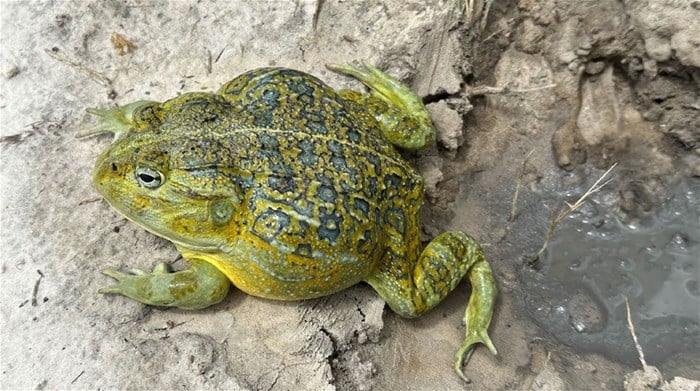|

Once there were three, now there are four. Professor Louis du Preez, from the North-West University (NWU) in South Africa, and his team of researchers, have discovered a new species of African bullfrog, called Pyxicephalus beytelli. This is only the fourth species of bullfrog ever identified in southern Africa.
The species occurs in parts of north-eastern Namibia, southern Angola, south-western Zambia and north-western Botswana, and is named after the late Ben Beytell, director of parks and wildlife management in Namibia, who was instrumental in the proclamation of the Khaudum National Park in Namibia, where the species occurs.
The new species is similar to all other species of bullfrogs in its external structure, internal anatomy and general behaviour. However, two of the main distinguishing features of Pyxicephalus beytelli are its bright yellow and lime green colouring, blue spots and a white vertebral line running down its body. Then there are its prominent and somewhat ferocious teeth, which are sloped backwards (recurved), and two large bony protrusions on the lower jaw.
“Their teeth really stand out, and we are excited to learn more about their feeding habits. I can promise you that this frog has a big bite,” says Du Preez. Bullfrogs have a varied diet that includes mice, small birds, snakes, insects and even other frogs.

Du Preez and a former student, Marleen Byron, first encountered the bullfrog in the Okavango 12 years ago, and immediately realised “there was something different about this frog”. In late 2021, Du Preez was commissioned by the Namibian Nature Foundation to conduct a survey of amphibians and reptiles in Khaudum National Park. “When I saw the bullfrog again, I knew it was the one I had seen a decade earlier.”
A thorough and painstaking process then began, in which the specimens collected were carefully detailed and compared with existing known species.
Du Preez attributes the belated discovery of Pyxicephalus beytelli to its habitat. “Getting to some of the places where Pyxicephalus beytelli can be found is extremely difficult. These places are remote and you have to cross rough terrain to get there. Also, people simply didn’t realise that it was a different species.”
From a conservation perspective, the identification of new species is of paramount importance to ensure their protection.
“Frogs evolved about 350 million years ago and have diversified from there. Today they are the most threatened group of vertebrates in the world. A big reason for this is the destruction of their natural habitat. The more we know about a species, such as its location and range, the better we can protect it. It is only when we have caused the extinction of a species that we realise what we have lost,” says Du Preez. “There is still a lot to learn about this new species, and the fun will be in finding out.”